| |
Taken from The Armenian Mirror-Spectator (Aug 09, 2021)
Danny Bedrosian Keeps the Funk Going, Boosts Habousi and the Armenians
by Aram Arkun
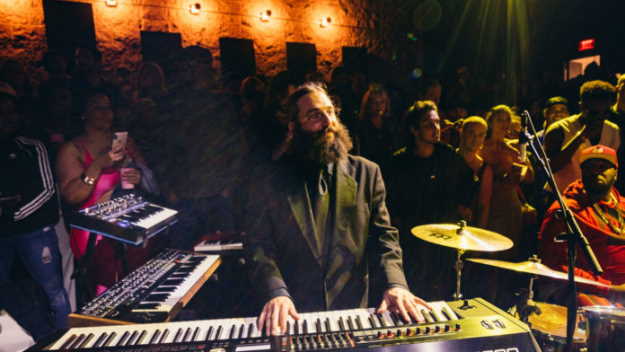
Danny Bedrosian performing on the keyboard (photo Rodji Munoz) |
TALLAHASEE, Fla. - Armenians can be found in nearly any corner of the world and in nearly every profession, so perhaps it shouldn't be surprising that one of the longstanding members of George Clinton's Parliament-Funkadelic collective, a group which is one of the standard bearers of funk music, is Armenian-American Daniel "Danny" Peter Bedrosian. Bedrosian simultaneously remains involved in Armenian music and culture.
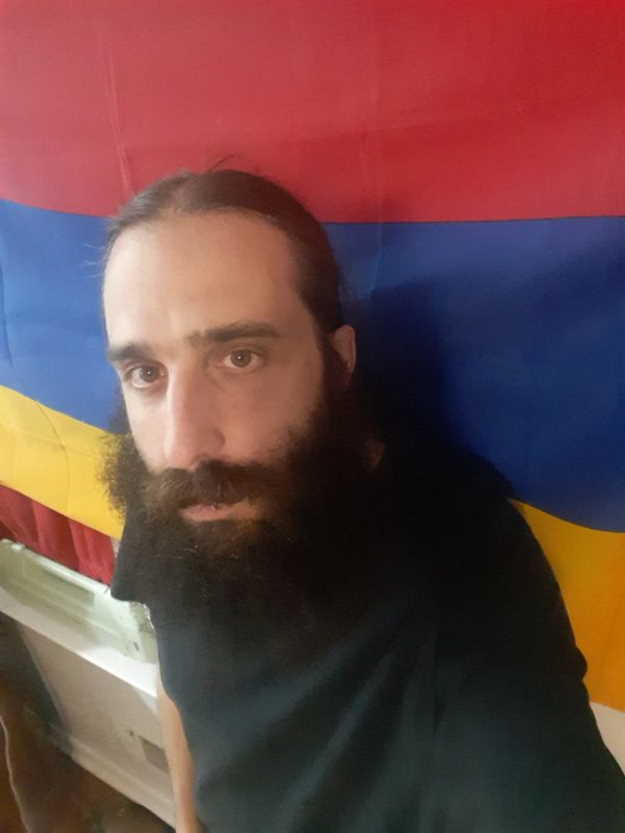
Danny Bedrosian in front of the Armenian flag (photo Danny Bedrosian) |
Parliament-Funkadelic, known as P-Funk for short, has its roots going back to the 1950s and 1960s. It consists today primarily of two bands, from which its name is composed, and dozens of musicians, all led by George Clinton, also performing in various spinoff groups. It created numerous top-ten and number one hits on American rhythm and blues music charts.
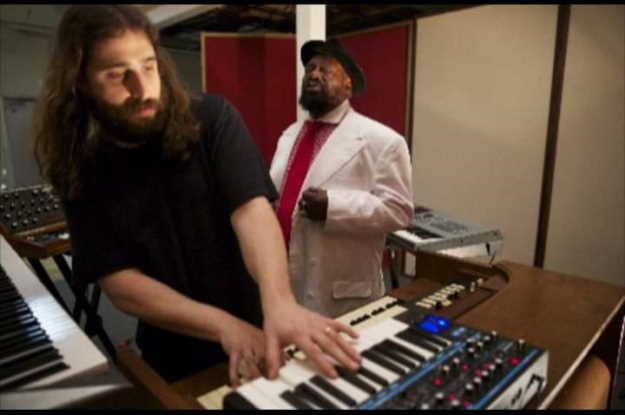
Danny Bedrosian playing the keyboards next to George Clinton (photo Chris Mayes-Wright) |
Into the World of Music
The 40-year-old Bedrosian has performed as keyboardist with P-Funk for 18 years and worked for Clinton for almost 22 years. Born in Lawrence, Mass., Bedrosian was classically trained in piano, as his parents ran a piano school, and studied from the age of 3 until he was 18 or 19. He began training in jazz and then learning about rhythm and blues and funk when he was 11 or 12, but he maintains a regime of classical music training to this day, doing anywhere between three to six hours daily.
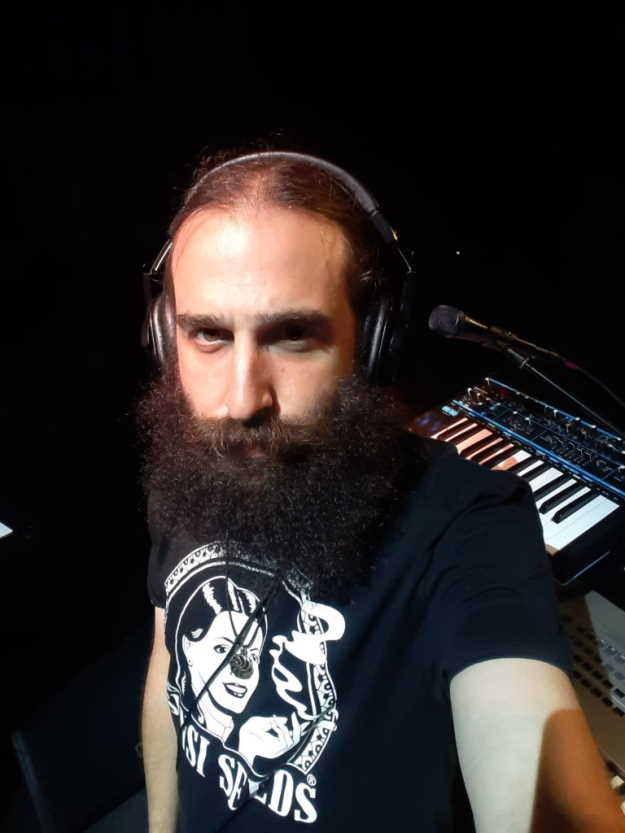
Danny Bedrosian (photo Danny Bedrosian) |
Bedrosian laughingly said his parents did not expect their children to enter into music professionally, and perhaps did not even wish it on them, as they knew what a difficult field it was through which to earn a regular living. They were pleasantly surprised, he said, when one of their children followed their vocation and reached a comfortable position in life. Bedrosian related, "They always say, we thought maybe he would meet George Clinton one day, but we didn't know he would end up doing all of this".
He related that ever since he was 11, Parliament-Funkadelic "was my favorite band, just for the fact that they played all genres, and had been around forever, even by the time I was a little kid... I loved the music, so I was always really drawn to it". He said part of its allure was its status as the longest-run popular music band of all time, with the largest discography of any production unit of all time, and the most sampled band of all time (meaning that segments of its music are reused by other contemporary musicians).
When he was in college, the rock and roll pioneer Bo Diddly asked him to join his band and work with him, and he had other non-musical career opportunities as well, but Bedrosian had set his goal as getting a job on the road with P-Funk as a keyboard player. He did not swerve from this decision, and as he described it, "I worked and worked and worked at it until I finally got it".
P-Funk
Bedrosian said that there have only been somewhere between eight and ten keyboard players in the history of P-Funk and he himself is the longest tenured one in the group's history. He was trained for five years by Bernie Worrell, who was the main initial keyboard player for the group and was classically trained like Bedrosian.
Worrell was one of the first to fuse Western European classical music with African-American rhythm and blues and gospel. Bedrosian said, "A lot of people compare him to the Bach of African American composition because he has so much depth and so much transcendence".
Bedrosian explained his role in the group as follows: "I am tasked with both the opportunity and the challenge of having to do live renditions of songs that may have five or six keyboard overdubs on them....I have been really interested in the keyboard canon and the song canon, and pride myself on knowing as much of it as possible, if not all of it". His role is complicated because the canon of P-Funk is vast, with thousands of songs and 700 releases, and he has to know how the original keyboardist played a song on the record, and understand all his variations. Then he has to figure out how all the successive players did it, because they all introduced their own variations. They were stylistically different, even note-wise, with different rhythms and harmonics.
Clinton can be a strict bandleader but he allows performers whom he trusts some extra autonomy, Bedrosian stated. Bedrosian has made it into that group through hard work, and as a result, he said, Clinton "has given me many opportunities in the show to shine, in many different ways". Bedrosian chooses which type of keyboards will be used and programs them himself. He has helped create some arrangements and has done a lot of writing and composition, creating parts. Over the years, he has solos here and there and has had the dominant instrument on certain songs in the shows. One example is playing the synth bass (keyboard bass) on Flashlight, one of the greatest hits of P-Funk.
Most notably, especially over the last three or four years, Clinton has given Bedrosian a little monologue before one of the big guitar solos of the night, where Bedrosian performs (plays and sings) alone a different song every night from the band's history that has never been performed live before. This is a unique part of the show, because the rest of the time it is many people on stage all at the same time. Bedrosian never repeats the same song, and keeps a list of the ones he has already done, which has reached the hundreds.
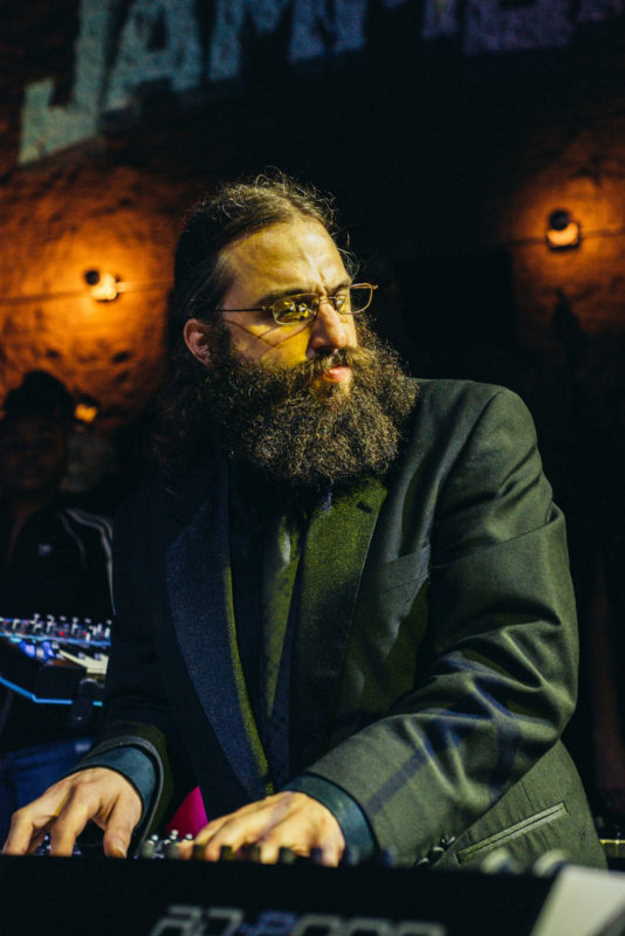
Danny Bedrosian performing on the keyboard (photo Rodji Munoz) |
His interest in the P-Funk canon evolved into the project of compiling a personnel and song encyclopedia of P-Funk history, 1955 to 2021, which is nearly completed and almost 580 pages. It is a full detailing of every single song across all the groups in which George Clinton has founded and produced, with information on who played and sang on those songs. The information, Bedrosian professes, comes from primary sources, such as about 60 members of the band, with whom he did over 80 hours of interviews, including Clinton himself and all the most important players.
Apparently many of the liner notes of the albums were incomplete or incorrect, so there is a lot of misinformation. Bedrosian said that there are some 200 different group sites on Facebook and all they are doing is arguing about who played what on which song. His book will serve as a great answer to those questions, he says, as well as an academic tool for study of P-Funk.
The P-Funk Worldview
Aside from the purely musical aspect of P-Funk, Bedrosian spoke about its philosophy or worldview: "George's music has always had certain social implications and some of them were more political than others. The interesting thing about him is that the worldview of P-Funk is that everybody is accepted. Everybody can be a part of this. It is very inclusive and very internationalized, especially in recent years".
Clinton's big 1978 hit One Nation Under a Groove showcases the one-nation flag, which, Bedrosian explained, is supposed to include the colors of everybody's flags to show that everybody should come together and love one another. The 1974 song Good Thoughts Bad Thoughts, Bedrosian added, was also very much on the philosophical side of things.
Even on his most political albums, Bedrosian said, Clinton was not providing a single point of view. Instead, he said, "He was saying it more like, there is this alternative, and there is this alternative, and then there is that one...He has always been the kind of guy, much like Bob Dylan, for whom there are a million different stories. None of them necessarily is the idea that this is how you should think, but it is just philosophy".
Each song has its own set of politics, and often on the most political topics, characters in the songs espouse various points of view. Even what Bedrosian thinks is probably the most political album of the group, "America Eats Its Young", from 1972, includes the songs Everybody Is Going to Make It This Time and If You Don't Like the Effects, Don't Produce the Cause, whose titles reflect a positive approach. He said, "A lot of it has to do with different iterations of what makes America tick. That actually was very inspiring to me".
A lot of the social themes have to do with the American civil rights movement and the Vietnam War. The early 1970s in particular included a lot on the latter. However, Bedrosian went on, in every era, the group has produced a really political album. In 1985, for example, "Some of My Best Jokes Are Friends" is about the Cold War relationship, and the idea that though it is supposed to be friendly, the finger is on the button (of missiles) at all times. In 1994, Parliament-Funkadelic released "Dope Dogs", which Bedrosian said is "all about how the government pretending that it is stopping the drug trade makes more money than actually being drug dealers itself", while "Medicaid Fraud Dogg" in 2018 critiques pharmaceutical companies making billions getting people addicted to various drugs. Clinton has also made songs dealing with hypocrisy in government, Bedrosian said.
Perhaps more significantly, the Parliament albums often highlight breaking social taboos, periodically through personification. For example, Clinton wanted to show African-Americans in places where people wouldn't associate them at the time, such as in the White House, or in outer space.
Informing the World about Armenia
Bedrosian's Armenian world intersects often with his musical one and with that of P-Funk. He related, "Oh, I think from day one the whole band knew I was Armenian. Several members of the band knew I was Armenian even before I told them, because a lot of the guys grew up in Detroit around lots of Armenians. One of my good friends, Michael "Clip" Payne, who has been in the band for 40, 45 years, knew immediately. He said, 'You are Armenian.'"
Furthermore, he continued, "I don't keep quiet about Armenian issues. Ever since I was young, in the '80s and '90s, I remember not seeing much information in Newsweek, US News and World Report, or any of those periodicals which deal with world news on a weekly or monthly basis...what is it, not important? Western news media downplays a lot of it. That was something ever-present for me, so I have always been very loud about what is going on in the Armenian world".
He realized that it was up to the Armenians themselves to educate and inform people. Consequently, he said, at least as far as the P-Funk collective's members go, "They are all very aware that I am Armenian. They have all been to Armenian events with me over the world - Armenian restaurants, Armenian gatherings, even Armenian festivals, and yes, I have definitely incorporated a lot of Armenian folk music into parts of my repertoire with the band".
His expressiveness about the Armenian story has had its effects. He said, "Being in a primarily African-American band, and playing this music, it is interesting that my most ardent supporters and friends, the ones who seem to understand and be the most on the side of justice when it comes to the injustices against Armenians, especially in recent years, have largely been African American". He estimates that 50-60 percent of his fans are African Americans, and finds that they understand injustice, as it has been very much at the forefront of their history as well. He finds that they react with camaraderie and solidarity. He summarized, "Being so many people's only Armenian friend in so many different groups, and traveling throughout the world through my job, has allowed me the opportunity to spread so much more information and get so much more support than if I had stayed in the Merrimack River valley, for example, and only had Armenian friends...It allowed me an extra megaphone, and I can tell you so many, many non-Armenians called their senators and signed petitions on our behalf because of what they learned about it, I am happy to say, from me".
He has also done some fundraising for various Armenian causes, such as issuing "Azadoom Kessab", a single dedicated to the Armenians of Kessab when the latter was attacked during the Syrian civil war in 2014. The proceeds later were extended to Artsakh during the 2020 war. A portion of the proceeds of his Secret Army album "Exaltation" went to refugees of Artsakh and Armenian soldiers and their families.
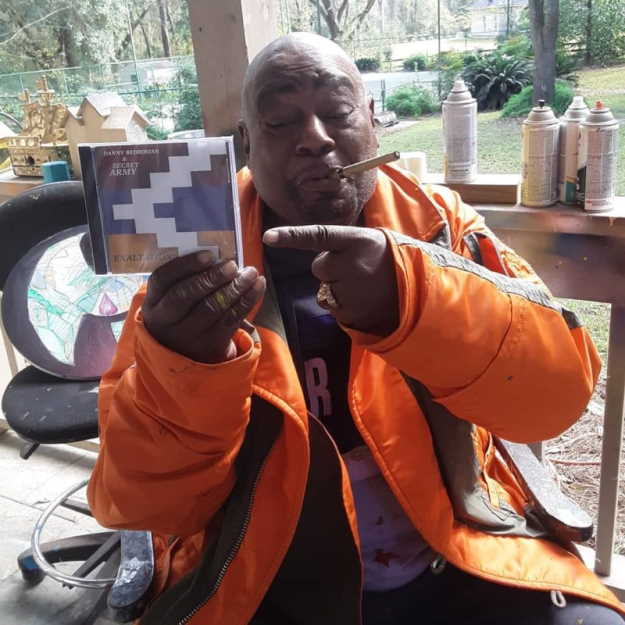
George Clinton receives his copy of "Exaltation" |
Heritage
Bedrosian was aware about his Armenian heritage from childhood. His father, belonging to the Church of Armenia, would take him and his siblings to Armenian churches periodically, and to Armenian picnics. Bedrosian can speak some Western Armenian but no longer fluently. When the older generation, survivors from the genocide, passed away, Bedrosian's father Peter started to speak Armenian less, and so did Bedrosian, as he no longer heard it at home. A complicating factor is that he only spoke the dialect of Habousi, a village in Kharpert province, when a child, though part of his family was also from Kharpert proper. He said that once he heard Armenian spoken by others, he realized that the Habousi dialect was very different.
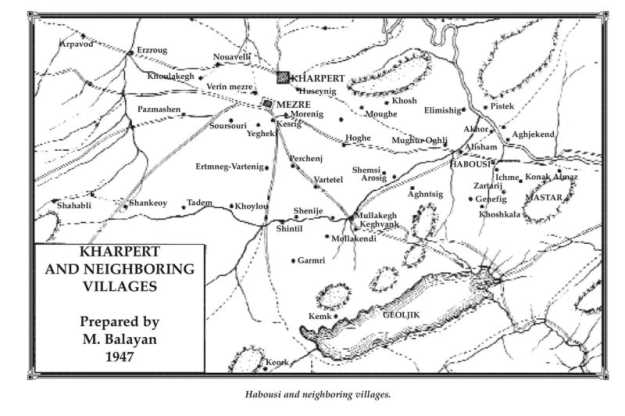
Map of Habousi and surroundings (reproduced from A Village Remembered: The Armenians of Habousi, ed. Vatche Ghazarian, Waltham, MA: Compatriotic Union of Habousi, 1997) |
Bedrosian's great-great-grandfather Bedros was a kehya or village chief of Habousi, Bedrosian related, who was killed in the Armenian Genocide. Bedrosian's great-grandfather Yeghia Bedrosian emigrated to the US before the genocide to work in the mills as a bandukht to raise money to return to his village. As the head of the Education-Loving Union of Habousi, he became one of the founding members of the Compatriotic Union of Habousi in 1925. He was focused, together with his son Garabed, Bedrosian's grandfather, on the education of Armenian orphans and slaves freed from the desert after the Armenian Genocide, and the two remained heavily involved in the organization until their deaths, Bedrosian stated. The Compatriotic Union, based in Vermont, still operates, though it is not active as before, and Bedrosian said that he tries to be involved as much as possible.
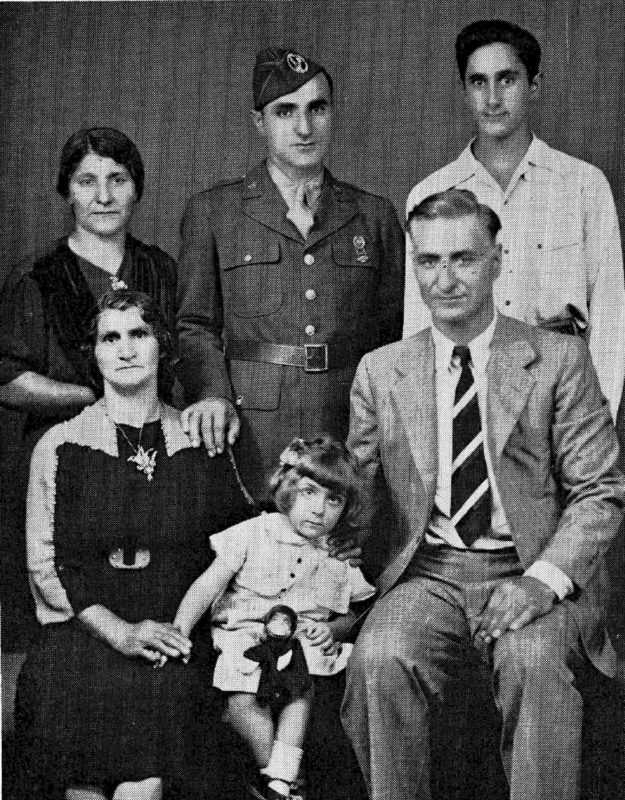
Bedrosian family photo: seated, from left, Mrs. Serpouhi Bedrosian, Julia Arakelian and Yeghia Bedrosian; Standing, from left, Mrs. Aghavni Kochakian, Garabed Bedrosian, and Manoug Bedrosian |
The Bedrosians not only have remained staunch Armenians but have shared a common interest which the staff of this newspaper greatly appreciates. As Bedrosian recounted, "I want to point out that the Armenian Mirror-Spectator has the title of being the only periodical that my great-grandfather, grandfather, father and myself read, over four generations".
Bedrosian had his DNA tested through the Armenian project in Family Tree DNA, and found out that he is related to four people from the Orbelian family and also connected to them by the paternal line, which goes back several thousand years. The Orbelian feudal or nakharar clan ruled Syunik in medieval times, and also had properties in what is Western Iran. It is possible that the Orbelians are in turn descended from the Mamikonian nakharar family. Interestingly, Habousi village was settled in part by Armenians from Iranian territories during the Ottoman-Safavid wars.
When he went to study at the University of New Hampshire, Bedrosian majored in Middle Eastern Studies, with a concentration in Armenian cultural studies, and did his historical colloquium on the 1988 Armenian earthquake. This topic was proposed to him by the university, he said, because, in his opinion, it was a little Turkophilic, and wanted to push him away from anything that had to do with past massacres and atrocities. However, he exclaimed, he still was able to include the Sumgait, Kirovabad and Baku pogroms into his earthquake thesis, all against the wishes of his advisers.
Bedrosian still follows developments in the study of Armenian history, and said that his girlfriend teases him that most of the things that he likes to watch are lectures by people like George Bournoutian on YouTube on anything dealing with the Armenian highland. He takes Armenian language lessons, and proudly declares that his children know a lot about the Armenian language, history and food, though half-Armenian.
Armenian Music
Armenian music has impacted Bedrosian's work as a musician. He observed that he was always attracted to the music of the zurna, as he felt it was very close to the synthesizer in its shrill tones and range, though he also likes the duduk and other instruments. He said, "The music of the zurna and all of that Armenian folk music that features that instrument really was a huge influence on the types of leads and melodic sounds that I would play on the synthesizer, especially at its most menacing points, musically speaking. I think it really represents a powerful part of the Armenian sound that I don't think is heard by the world at large".
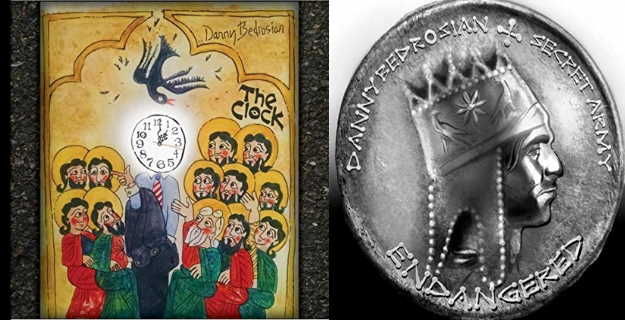
Some of Bedrosian's album covers: "The Clock" cover, 2015 (left) - "Endangered" cover, 2014 (right) - even use Armenian themes |
He incorporates that sound on some of the newer songs he is doing with George Clinton, including on the last Parliament and the last Funkadelics albums that feature a lot of things that Bedrosian is doing. They include Armenian modes and things that would not be too dissimilar from what a zurna player would do in an Armenian folksong. Furthermore, he said, "Conceptually speaking, in my own music, I tend to talk about Armenian things as well. The influence has a musical and a lyrical side to it".
Armenian-Themed Comic Books
Ever since junior year in college, Bedrosian said that he has been working on a book which he started over and revised multiple times, but never finished. It was about the migrations of the various tribes of Armenia and how they came together to form what we know as the Armenian people today (i.e. ethnogenesis). New archeological and genetic data have changed so much that Bedrosian said he became frustrated, with so many variables in this project.
At one point, he decided, he said, to put bits and pieces of it into comic books. He has been reading comic books ever since he was in first or second grade and always liked the idea of mythology presented in comic book fashion, mixing science fiction and mythology. This is how his comic book series Sons of the Sun, or Arevorti, arose.
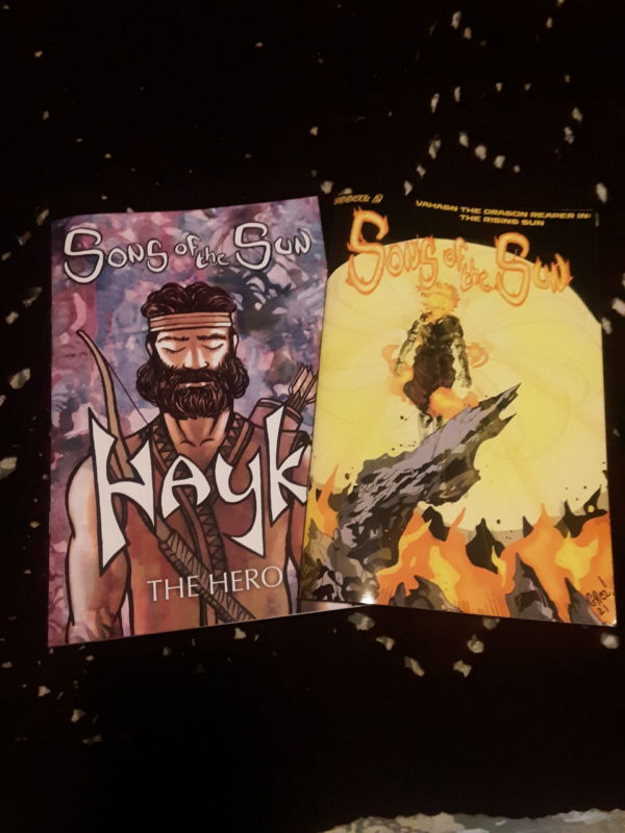
The first two issues of the Sons of the Sun comic book (photo Danny Bedrosian) |
Bedrosian said, "In doing the first issue, I found myself incorporating numerous tribes, deities and characters that were synonymous with certain geographical areas that fit into the story". He said this format allows getting such information about the Armenian past to non-Armenian audiences, and each issue includes a map page.
It is a niche item which may appeal to those interested in mythology, fantasy, history, or just comic books in general, as well as to Armenians. Even fans of Bedrosian's music and P-Funk form a part of the potential reader base. After the third issue comes out, Bedrosian plans on working with a major publisher to make the series into a monthly book. For now, the copies are made in limited runs and independently distributed as well as through some comic book stores.
The first issue, Hayk the Hero, came out in 2019, and is out of print, while the second issue, Vahagn the Dragon Reaper, appeared two months ago. At the end of 2019, he digitized the first issue and paired it with his music album "Lusine and Arev", a love story between the moon and sun.
Independently Performing and Creating
Bedrosian in addition to being a member of P-Funk, has his own bands, performing and recording independently, including Sweet Motha Child, Som'n Fierce, and Secret Army, as well as his completely solo musical work. He explained that you could look at P-Funk as being his main "job", where although new music is created, there is also an existing discography written by other people that he has to perform. While he loves this, he said, "The artist in me - when I want the freedom of being a free agent, an independent contractor - wants to be able to do whatever it wants and have my own independent production unit at home".
In a sense, his independent work can still be considered a branch of P-Funk, he said. George Clinton also happens to live just right up the street from Bedrosian, so they work together on many things all the time. However, ultimately, he said, "It is just restlessness. We get off the road [from tours with P-Funk] and there is so much time at home. I want to be doing music then too, so that you have your own solo projects in addition to whatever gigs you have. I keep having ideas. Certain compositional arrangements make sense for my work in P-Funk". Others apparently do not.
When he issues albums through Secret Army, Bedrosian said, "I am always trying to use it as my vehicle for justice and knowledge. My solo albums have been a vehicle for transcendence and genre-bending, trying new things out, while Secret Army is the group for when I am off from George, that I use for more thematic content albums".
Bedrosian has put out 18 or 19 albums in his own name over the years, starting from 2005, he said. In addition, he does a lot of freelance production and vocal work for many artists outside P-Funk. He said he just did some work for Jefferson Starship and Snoop Dogg, for example.
Bedrosian's albums are very eclectic, varying not only one from the other but even internally. Some feature large ensembles of 30-40 people, and others just have Bedrosian. There are jazz, classical, P-Funk, Armenian and electronic music elements.
There is one constant, however. He said, "On almost every one of my albums there is at least some Armenian stuff in there, very traditional style or with just a single drone". It could be classic Armenian pieces, variations on them, or something Bedrosian created based on Armenian material. He has some Armenian folk instruments such as dumbek, duduk, shvi and zurna, and he has been able to incorporate them in some music. He has done all-synthesizer versions of songs like Jivani's Sasounasar.
His most recent album independent of P-Funk is called "Garmir Caramel", and is a collaboration with the brothers Nalbandyan, two producers and musicians from Yerevan. Bedrosian said, "It is like a classic 1970s funk and R&B sound, but with modern production. I am really proud of it and of working with these guys from the Republic of Armenia". They had contacted him and said that they love funk music, but an Armenian guy in P-Funk, "it just blows our mind". And that began their collaboration in 2019.
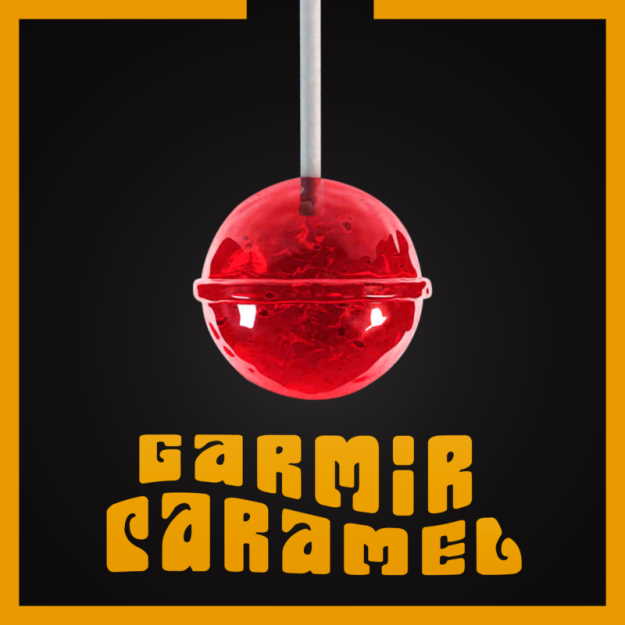
The cover of the album "Garmir Caramel" |
Bedrosian has performed several Armenian folk music concerts over the years with an ensemble which can be as small as a trio and as big as a dectet. He performed with it at the centennial of the Armenian Genocide, which not coincidentally was sponsored in part by the Compatriotic Union of Habousi, and continued with performances afterwards.
Names
An interesting sidenote is that the name of his band, Secret Army, has an Armenian connection. Though it sounds similar to the Armenian Secret Army for the Liberation of Armenia, Bedrosian said, "It was not necessarily specifically this, but that we are strong, and anytime we could have a real secret army. That was from my really radical days". It also refers to the insider understanding that there is a P-Funk "army", which Bedrosian says continues to form the bedrock of that group - basically the rhythm section of P-Funk.
Bedrosian explained further: "I was at the time very angry, in my early 20s, but still philosophical enough. The idea was not necessarily that secret army, but that at any time, we should be able to have a real secret army to have real liberation from imperialism, and the liberation of our lands from adjacent countries. I would still like to see that, but the idea of reparations is definitely an interesting topic to debate".
Although he said he has "softened over the years", after the Artsakh war, "something like this happens, and it turns you more back towards the person you were before. My mindset is different now that I am older. I am just slightly wiser and able to internalize it in a more productive way".
Bedrosian also uses another name with an Armenian connection, Bozfonk Moosick, for his company that handles the production and publishing of music. "Boz" for Western Armenians and Habousi Armenians in particular can mean the colors golden or gray. Bedrosian said, "My first usage of it was to attack the Grey Wolves [the far-rightist Turkish neofascist organization] and take the word back from them. Also, a lot of my philosophy is that the grey is in-between, as nothing is ever just black and white. Nothing is ever absolute". (The word should not be confused with a word spelled differently but pronounced the same in Eastern Armenian that has a very different meaning.)
He went on to elucidate that when he started using this name, genetic information was coming out about Turkish DNA having a large percentage of Armenian component, with the Central Asian admixture really downplayed. Presumably, when the Turkic peoples arrived in the Armenian highland as nomadic horsemen, they were a minority compared to the millions of indigenous people. Bedrosian said, "The idea that you become whom you enslave was always at the forefront of what I was doing musically, especially in my younger years...Cultural appropriation of our things by the Turks had become commonplace a long time ago, way before the Genocide. So, you have this word? I am taking it back and putting it on my music".
Covid and the Future
During the pandemic period, Bedrosian came up with something called the "request zone". People could request any song or genre from him and he would send them a personalized video of his performing it. Bedrosian said, "The response was overwhelming. It became my main job for pretty much all of 2020. I would get multiple requests most days, and what a variety of requests there were. It was a fun thing to do". People donated however much they wanted to pay. He also recorded one concert from home in high definition and sold tickets to it in this period.
After the halt in travel due to covid last year, P-Funk slowly is revving back into doing shows. It gave a series of performances in New York's Central Park a few weeks ago and in Connecticut. Then there was an 80th birthday party for George Clinton in Los Angeles. There will be a tour in September in the Midwest and the South, and hopefully in the fall things will continue to open up, Bedrosian said, allowing a tour to Europe next May which has been put off now for several years.
Bedrosian said that while Clinton began a semi-retirement at the end of 2019, he then changed his mind. Whenever he does stop, however, Bedrosian said that Clinton plans for P-Funk to continue without him. "The great thing about this band", Bedrosian continued, "is that it has members from every generation, and a good portion is from the younger generation, with several members in their twenties. That has always been the case. It has always been multigenerational".
Meanwhile, another album will come out by the end of this year of various lesser-known songs of the P-Funk canon that Bedrosian has played in concerts, together with Bedrosian's reference book. Bedrosian is also doing an album with all the youngest members of P-Funk which will come out around the same time.
He continues to do a video podcast, called Danny on Everything (Dannyoneverything.com) as well as has his own website (dannybedrosian.com). The podcast is very varied, with concerts, interviews, and discussions that not only are on musical topics but can range as far as comedy or a talk on the "Star Wars" movies. Bedrosian's music is available for download on many major sites.
|
|